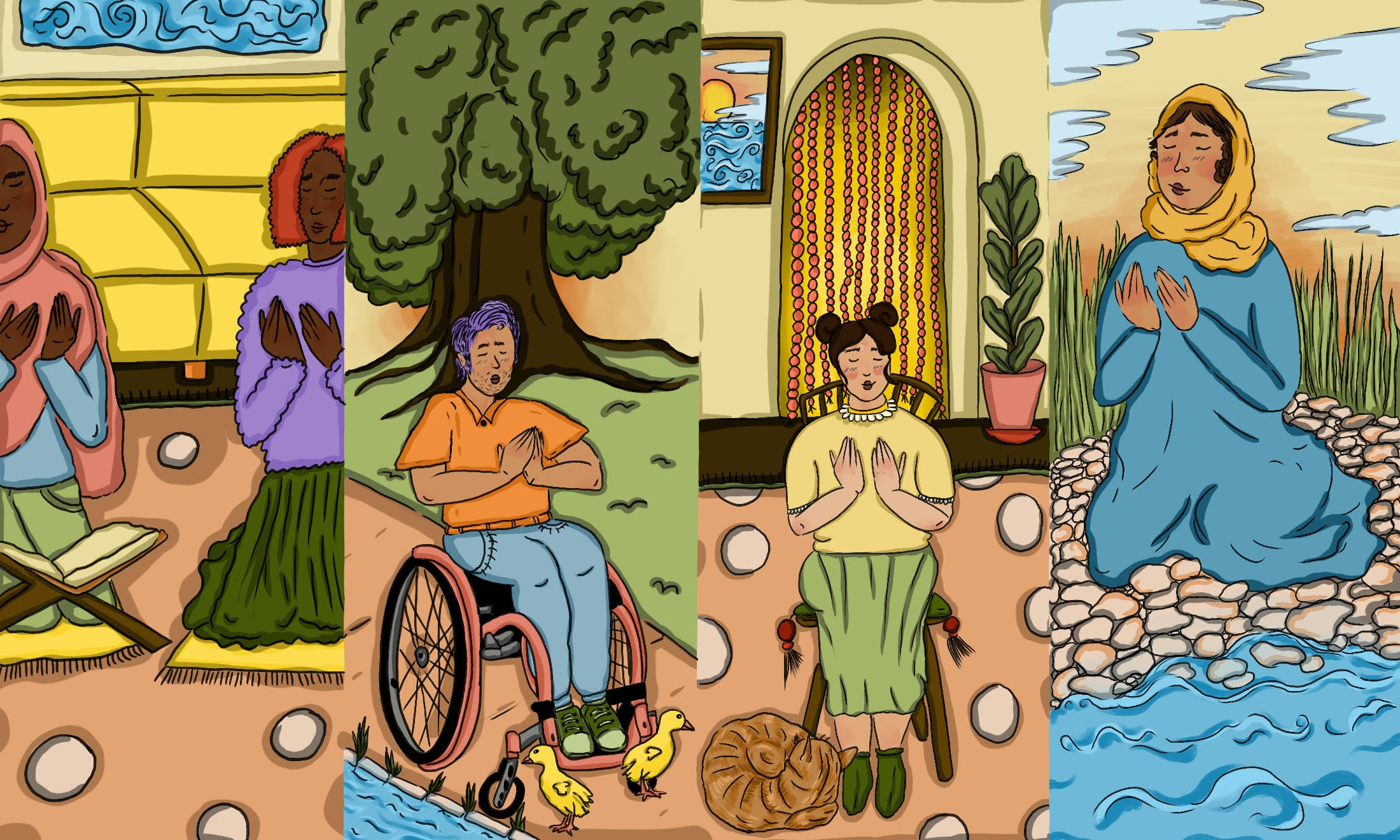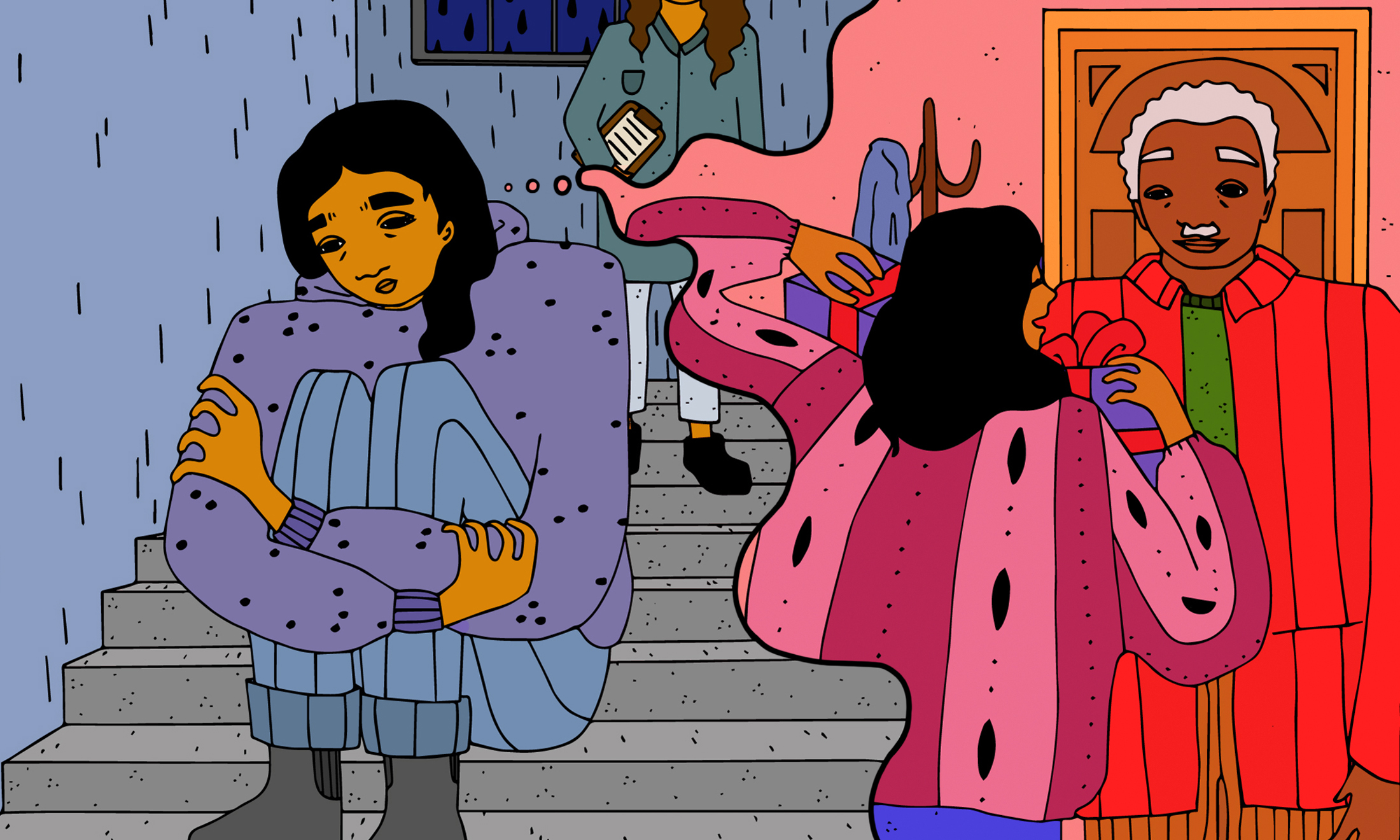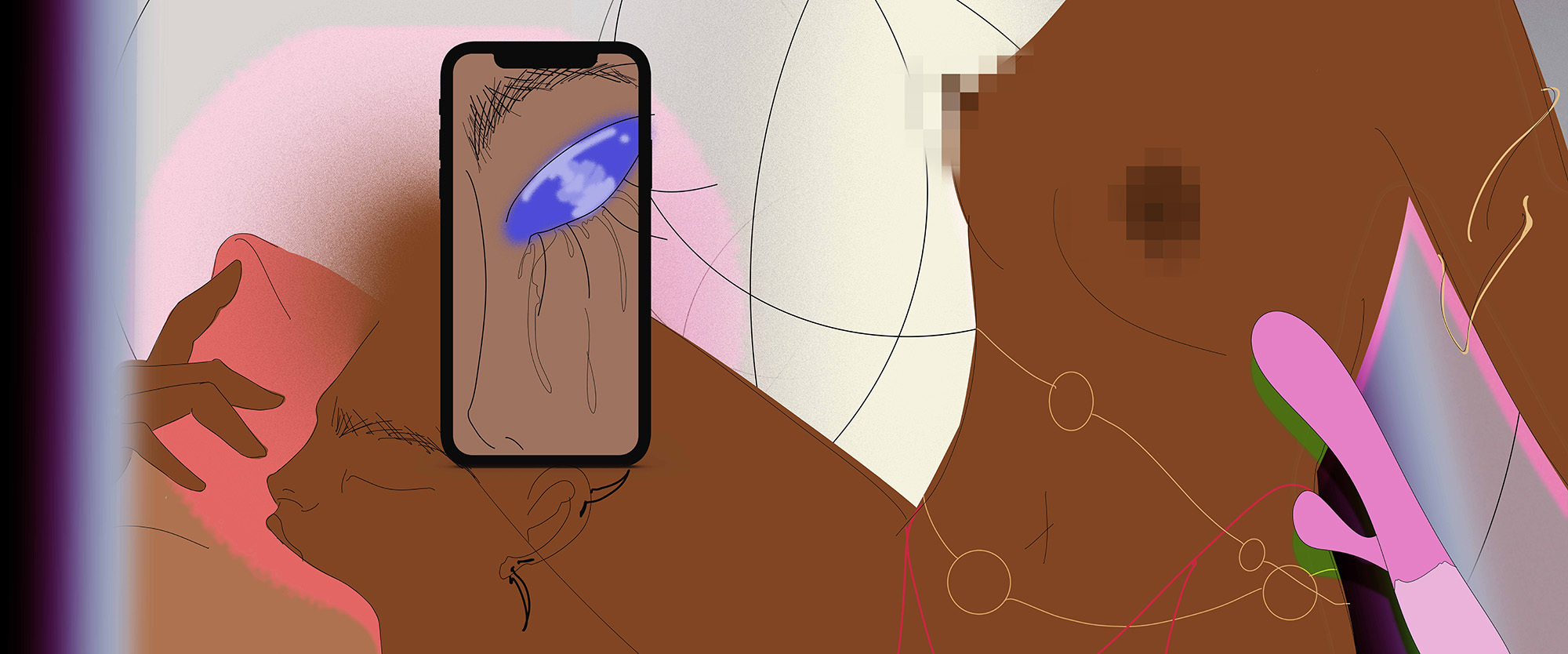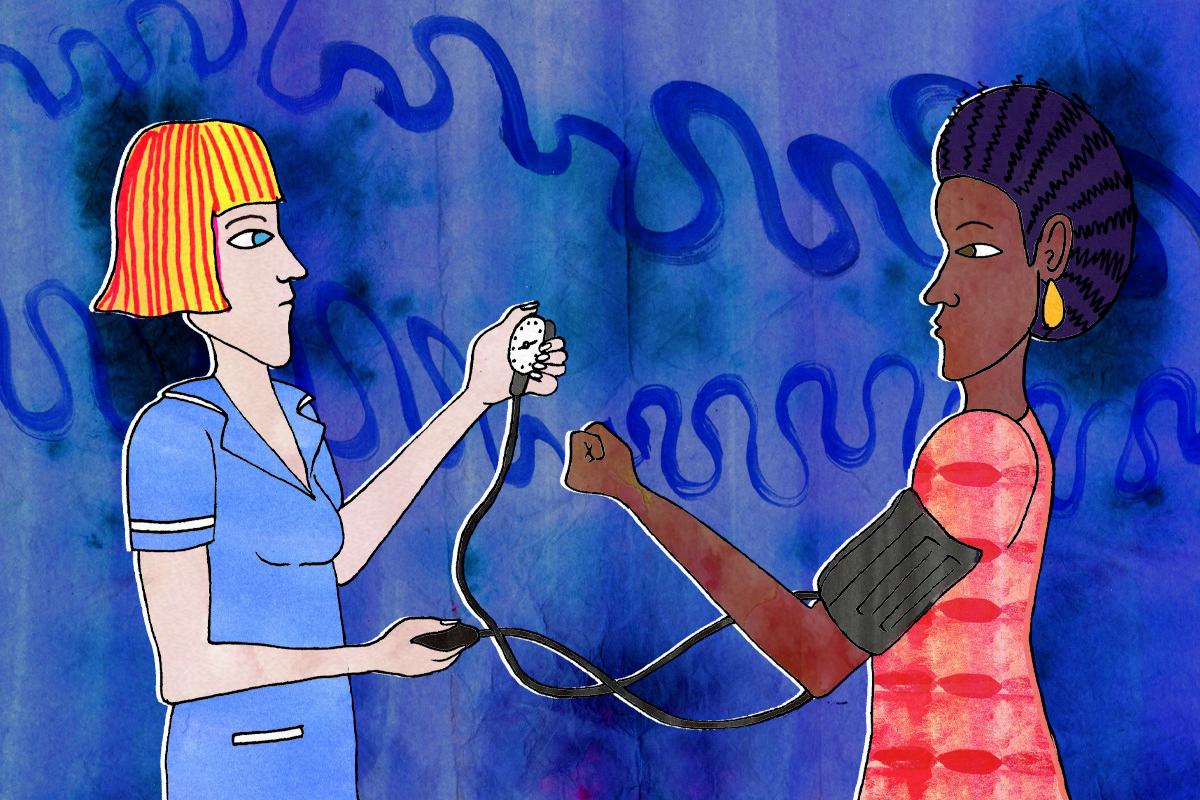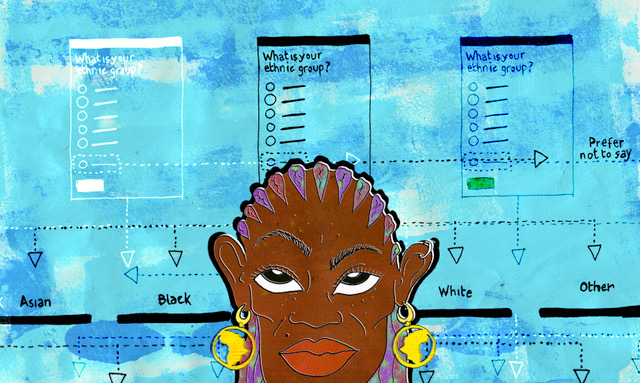
Illustration by Tessie Orange-Turner
Race tick boxes and bad science mask the real reason why black people are at risk from Covid-19
When it comes to the disease, Dr Annabel Sowemimo explains that we should remember that how we are racialised is not the same as genetic difference.
Annabel Sowemimo
28 May 2020
Illustration by Tessie Orange-Turner
I had been meaning to register at a new GP for several months. Work and life had meant I had left it a little too long. My eyes scanned the online registration form – names, date of birth, age, address, past medical history – and there it was again. The exhausting question we have all become so accustomed to answering: “What is your ethnic group?”
I sighed, irritated, and placed a cross in the box next to “Black African”, given that there was no Black Other, Black British or “Can we talk about how these categories are unhelpful?” option. I noticed with even greater irritation that the other boxes included White British, White Irish, Asian Pakistani, Asian Indian, Mixed (Other) and White and Black Carribean. A bewildering assortment of racial, country of descent and continent of descent mixed into one. They were not asking what my ethnicity (a social group by cultural or tradition) was at all but rather how I was racialised – and did they even understand what data they were collecting? I completed the rest of the form, clicked send and vowed that it would be my mission to at least make the medical profession make more sense of this question.
I was not expecting to have this issue launched into the public consciousness with such ferocity through the stark disparities in the Covid-19 pandemic data. “Black people are four times more likely to die of Covid-19” the bylines and news headlines scream. I am astonished, horrified and exhausted, but probably not for the same reasons as everyone else. The data was shocking, yes, but worse still is the way the data has been collected and is still being presented. I scrolled through multiple papers, all showing the exact same categories: Black Africans, Black Carribeans, Pakistanis, Indians, Bangladeshis and White. These patients had filled a form like mine at some stage; the standardised way of collecting data in medical research about racial groups but what is it supposed to measure?
“The data was shocking, yes, but worse still is the way the data has been collected and is still being presented”
Who are Black Africans? Is that me – a second-generation black Nigerian (with known Afro-Brazilian and Sierra Leonean ancestry) or is it my aunty, a first-generation migrant of mixed European and Nigerian ancestry? Why is the data collected as simply Black African or Black Caribbean – a continent and a collection of islands – in contrast to individual South Asian countries? There are different cultures, religions and ethnicities that overlap in both India and Pakistan – an arbitrary line drawn in the sand.
I am not a geneticist, just a concerned doctor with a bit of a background in anthropology. I first confronted science’s dark ties with racial categorisation during my medical anthropology, undergraduate degree. I read the musings of philosopher Immanuel Kant, the first to use race as we do today. In his taxonomy, there are whites, negroes, hun and Hindustani. Immanuel was a delight, writing that dark-skinned Africans are “vain and stupid” while those of the white race were “active, acute and adventurous”. Others such as Blumenbach followed, using skull size to further divide the races into five categories which persisted into the 20th century. Such categorisation was then used by the founder of eugenics, Francis Galton (the half-cousin of Charles Darwin), and his protege Karl Pearson to make assumptions about an individual’s genetic quality purely based on their physical characteristics such as skin tone. (Ironically, I think I had a fair few lectures in both the Galton and Pearson Lecture theatres at University College London).
More advanced genetic studies show that racial categorisation simply does not obey these boxes. A scientific paper by Rosenburg is frequently used by the alt-right to suggest that these initial colonial categorisations of race are correct – that we do in fact cluster into five distinct races. However, what they frequently omit is that these clusters aren’t races but, actually geographical locations and within regions, there is a large genetic variation with no uniform identity.
During the last few weeks, we have seen a multitude of theories proposing that various genetic factors are to blame for the racial disparities in Covid-19 data including pre-existing conditions like diabetes, cardiovascular disease, low Vitamin-D levels and weak immune systems. I have witnessed TV commentators suggest that some shared genetic material amongst “BAME” groups could be placing them at heightened risk of disease. “BAME”, a group that includes both non-white and white marginalised groups like the Irish traveller community. A suggestion that marginalised groups all have a similar genetic predisposition based on their collective belonging to the acronym “BAME”. Confused? Me, too.
“I have witnessed TV commentators suggest that some shared genetic material amongst ‘BAME’ groups could be placing them at heightened risk”
Almost exactly 20 years ago, on June 26, 2000, Francis Collins and Craig Venter announced that human beings are 99.9% genetically identical after sequencing the human genome. Subsequently, we now know that race is just 0.1 per cent of all genetic material. Research suggests that about 85% of all human genetic variation occurs within geographically distinct groups, with 15% or less variation occurring between them. Yet, despite this, a huge pot of scientific funding is consistently devoted to exploring that minute 15% through popularising ancestry testing and searching for race-based genes. It is a travesty to witness.
Sarah Tishkoff and her group of scientists undertook the largest genetic study of those of African descent; some of these findings include that there is the greatest variation in skin pigmentation in Africa than there is in the rest of the world and that variation in skin tone likely predates our evolution outside Africa. We now know that there is greater genetic diversity in Africa than anywhere else on earth yet, until fairly recently, there had been fairly little genetic sequencing of those of African descent (quite bizarre given the amount of racism that we have endured due to hypothesising on our genetic inferiority). So when I tick Black African what are we really talking about? What does it tell us about the genes that I have actually inherited? Not very much.
Race is not a proxy for genetic difference. Black is a social construct – this box is ticked by so many people – those of mixed heritage, first-generation Black Africans, second-generation Black Carribeans – it makes no sense. People often have mixed ancestry that is not reflected by their skin pigmentation – we know this!
“Race is not a proxy for genetic difference. Black is a social construct”
We also know that some conditions, such as sickle cell, predominantly affect those of African ancestry but this was discovered by looking at genetic ancestry not through a tick box exercise. What this tick box can tell us is how that individual is racialised and how that may align with other socio-economic factors. For example, the 2020 Marmot Report showed how health inequalities are linked to factors such as poverty, low educational attainment and rates of incarceration and that we are seeing a stalling of life expectancy amongst groups most affected by these issues, including Pakistani and black Caribbean communities.
Genetic theory has been revived by the alt-right and easily accessible genetic testing is being used as a means for people to prove their “white purity”. Yet this movement fails to account for the fact that despite having majority European ancestry, an individual may still racially present as non-white and that DNA in and of itself is a flawed way of discovering your background. Genes simply do not fall into the neat racial boxes that humans have created.
It is vital that we better understand what role race plays in health care outcomes and how far racism and social justice issues impact healthcare. But, if we are going to achieve this, then we as a society must collect the right data. We must demand that the appropriate boxes are created and if the boxes are not logical then we should ask why they are there at all. So next time someone hands you a form which asks your ethnicity – carefully, ask if that data is useful, helpful or if it’s just reinforcing bad science.
For more reading to expand your understanding of genes and race, see How to Argue with a Racist by Adam Rutherford, Superior by Angela Saini, The Problem with Race Based Science by Dorothy Roberts and How racism makes us sick by David R Williams

Britain’s policing was built on racism. Abolition is unavoidable

How Pakistan’s Khwaja Sira and transgender communities are fearing and fighting for their futures

Their anti-rape performance went viral globally. Now what?


